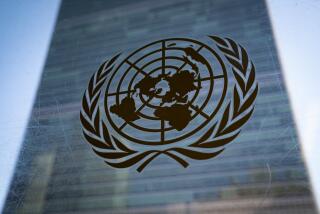Iraq Insists U.S., British Aid Workers Go Home
- Share via
UNITED NATIONS — Iraq warned Monday that it would be unable to protect U.S. and British aid workers in the country from “deep popular anger” and insisted that the United Nations should replace them for safety reasons.
Iraq issued a note to the United Nations to clarify statements made in Baghdad last week that U.S. and British humanitarian aid workers were no longer welcome.
“The sense of anger that besets 22 million Iraqis may find expression in unfriendliness on the part of some of them vis-a-vis program personnel of the United States or British nationality, particularly in the case where those dear to them were killed in the barbarous United States and British bombardment,” the note warned.
U.S. and British forces bombed Iraqi military and communications buildings Dec. 16-19 after U.N. arms inspectors accused Baghdad of obstructing their efforts to search out and destroy Iraq’s weapons of mass destruction.
U.N. resolutions don’t allow Iraq to dictate the composition of U.N. teams. Nevertheless, host countries are responsible for the safety of U.N. personnel on their territory, and Iraq’s claim that it cannot ensure that security puts the United Nations in a bind.
John Mills, spokesman for the U.N. program in Iraq, said Monday that Baghdad will allow four Britons, who are working for contractors, and three Americans, including two senior U.N. officials, to remain in the country but will not renew visas for nine Britons and an American working with the humanitarian programs.
The Iraqi note said that “the prime fact is the deep popular anger in Iraq against the United States and the United Kingdom as a result of this unwarranted aggression.”
The Iraqi decision, if carried out, would increase tensions at a time when the entire U.N.-Iraq relationship--weapons inspections, sanctions and the humanitarian program--is being reassessed after months of crises over arms searches that culminated in last month’s missile and bombing campaign.
The U.N. humanitarian team, made up of about 400 people, is in Iraq to distribute food and medicine under the U.N. oil-for-food program, which allows Iraq to sell limited quantities of oil.
Iraq has been barred from selling oil on the open market since its 1990 invasion of Kuwait. The embargo cannot be lifted until U.N. inspectors certify that Iraq is free of weapons of mass destruction.
Meanwhile, in Washington, State Department spokesman James P. Rubin said that one of Iraqi President Saddam Hussein’s sons, Qusai, who heads Baghdad’s special security organization, directed the killing of hundreds of Iraqi dissidents in November in the Shiite Muslim region of southern Iraq.
Rubin said that tensions in the south, a stronghold of anti-Hussein sentiment, rose after the assassinations of two clerics last summer.
Over the past six weeks, he said, there have been reports of mass arrests throughout the southern region and in Shiite areas outside Baghdad. Also, there have been hundreds of summary executions of dissidents at two prisons, he said.
“The repression reportedly reached a peak in November, with hundreds killed in actions directed personally by Qusai Hussein,” Rubin said.
Rubin said opposition sources from the Shiite areas reported that seven villages were recently destroyed or turned into military outposts.
He added that more than 2,000 civilians who were unable to flee were reportedly taken hostage by regime forces and possibly sent to Baghdad. They were made up largely of the old, the infirm, women and children, he said.
As a means of protecting Iraqi Kurds in the northern part of the country and the Shiites in the south, the United States, Britain and France established two “no-fly” zones and banned Iraqi military flights in the regions.
In remarks Sunday to his Cabinet, Saddam Hussein called these zones illegal and vowed that Iraq will fight violations of its airspace.
More to Read
Sign up for Essential California
The most important California stories and recommendations in your inbox every morning.
You may occasionally receive promotional content from the Los Angeles Times.













